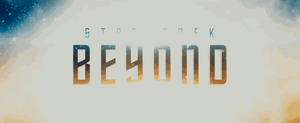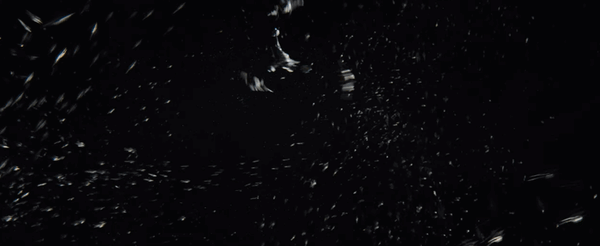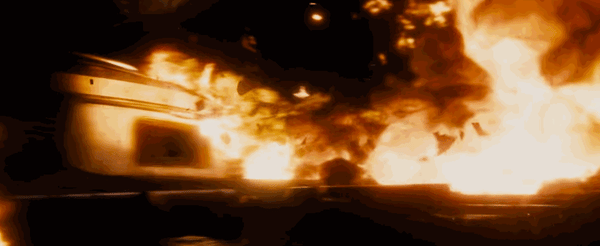 You might notice there are three separate condemnations of haywiring isolationist psychos hitting the movies this summer.
You might notice there are three separate condemnations of haywiring isolationist psychos hitting the movies this summer.
The timing couldn't be better if God himself carved it into the walls of his prison cell with a toothbrush shank like this is the year we finally get out. We're going through the final, painful transformation.
First, we had Civil War (go team Cap), wherein Iron Man wants to take authority from Captain freaking America. Next, we spent three hours learning that Batman is a violent, childlike weirdo who grew up wrong.
This brings us to Star Trek Beyond. It's unfortunate the film was built as a space action-adventure, which it is: but it's also a prescient moral lesson about mankind's obsession with war, domination, and life's emptiness when we stare into the universe bucking and exploding within our own skulls.
Understanding Star Trek Beyond's simple message.
Star Trek Beyond begins on a sour note. Captain Kirk is bored with his job. Space bores him. You're meant to feel his anxiety around not doing more. He wants to go further.
Don't we all?
It's a simple discomfort that most will sympathize. Can't we go further? Layered atop that is the usual daddy issues. Kirk is worried he's still traveling under the inertia rippling out from his father's life and death. He wonders if this is why he's out there in space in an armed vessel.
The Enterprise is a peacekeeping ship though. The Federation is a peacekeeping organization. Their mission is exploratory. That's a big, important difference to be discussed in a moment.
As the Enterprise is attacked and the crew is separated on the hostile planet, you arrive with Kirk at the story's question: does peace belong in a hostile universe?
What is the universe's natural resting state? What is the resting state of the untamed?
Is anyone within their right to bridle the actions or environments of another?
Kirk, a kid raised in a society at war, joined the military "on a dare," as he puts it, because of his father. Has his environment made him a conqueror? No. And yes. The Federation and his crew have made him a peacekeeper. Not his father. Not his other, dumber, more violent adventure, Kirk is embodying a thankless, difficult task in a resistant universe.
The resistant, isolationist universe is manifested in Krall, the villain.
++ Star Trek Beyond spoilers ++

Krall is a beautiful moron. He is a hideous jerk. He is the inside of a villain's brain. He's been alone, crawling around within himself for who knows how long? That's important to dividing the line between him and Kirk, between good and evil, between order and chaos.
Between isolation and unity.
It turns out that the villain of Star Trek Beyond is: slowly going insane by yourself at the far end of the galaxy.
Krall becomes diluted, hateful, resentful, envious, cruel, and confused. He becomes wrong. He's wrong because he had nobody around him to right his course. A mind by itself can go insane.
Krall was formerly a Starfleet captain Balthazar Edison. Not complacent having a truly awesome space-name (Balthazar Edison!), he was a man who went too far out into space, breathed too much crazy, and let the Darwinian part of his brain snatch the wheel. He draws drawn from his loneliness. He depends on a drone army and millions of mindless locust-swarm style attack ships.

The two sides are set: Kirk's peacekeeping unity against Krall's single-minded destruction.
There's tragedy in Krall's character. He's a former soldier given an explorer's rank after the wars run out. This is potentially a case of PTSD or a retired soldier's incompatibility with peace-time. That's common and a tragic symptom of war that many don't measure ahead of time. Krall misunderstands Starfleet. He believes he and his crew were abandoned on the hostile planet.
Isolation becomes his lifeline. More of a pink noodle pool-floaty.
Star Trek Beyond goes out of its way to remind us, in a way Star Trek is so good at, that isolation is not the solution.
Jaylah demonstrates this. Jaylah is alone on the hostile planet, as well. She scavenges for parts to build a ship to escape when Scotty encounters her. When she teams up with Scotty and the crashed Enterprise crew, it demonstrates total isolation and distaste for life leaves you trapped. She and the crew help each other get off the planet.
Then there's a fantastic special effects blow-out set to a magnificent needle-drop. It's outrageous. I love it. It's weirdly similar to when they use the humpback whales to talk to the amorphous space entity in Star Trek IV.
But I digress.
This is "us" (plural) versus "you" (singular) the closest Star Trek has come in a long time to a utopian vision. "We" is optimism, knowledge, and life. "You" is fear, stubbornness, and bloodlust.

